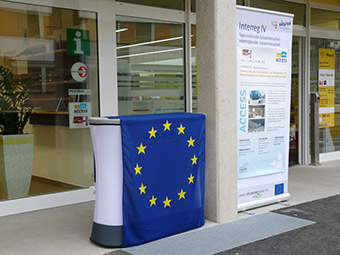The ACCESS project made services such as public transport, delivery of goods, and information and communications technology (ICT), more accessible for people living in mountainous rural areas across five European countries.
Better access to services for Europe’s alpine areas
- 22 March 2019
ACCESS aims at improving the accessibility to services in sparsely populated mountain areas. For that purpose it concentrates on new forms of organisation, for example by initiating or supporting public-public or public-private partnership. Fundamental for ACCESS is the focus on the use of ICT as well as on demand-oriented, integrated mobility systems.
Alpine areas are often sparsely populated and people who live there face difficulties accessing general services. The project improved accessibility of services by tailoring delivery for local needs, mixing private, public and voluntary services, and involving the end users.
A total of 24 pilot projects were implemented. Transport solutions such as car sharing and using nature park buses were organised. Goods were delivered to homes and through retail networks. ICT and video link meetings were initiated to enable contact with service administrators. A collection of best practices, guidelines and a report on how to improve services in peripheral areas was published to inform legislation.
User-centred approach
The accessibility of services is a core issue in the functionality of mountain areas. These rural spaces are often characterised by a decline in the number of residents, who relocate to seek better opportunities, and an ageing population. The lack of access to services can lead to a vicious circle of further deterioration. Improving services increases quality of life, attracts new inhabitants and small to medium enterprises.
The project built on a predecessor called PUSEMOR, which revealed that services must focus on people’s needs and their use of infrastructure, rather than on the infrastructure itself. ACCESS advanced this research and created networks and cooperation between urban centres and rural areas.
To raise awareness, a number of workshops and public conferences were organised in Italy, Austria, Switzerland, France and Germany. A total of 44 media articles, five TV documentaries and three radio reports were published.
Pilot Projects
Twenty-four pilot projects were implemented focussing on three main service areas: ICT, public transport and availability of convenience goods. Among them was a centre of mobility in Southern Carinthia, Austria, which provided public transport services from one central outlet. In the Franche Comte region in France a video service desk which provides virtual meetings, enabled citizens in four municipalities to contact regional public service units for social care, health insurance and job searches, among others.
Another pilot project consolidated small food retailing shops with a consultancy office on retail trade to help maintain small food stores. These trial ventures would remain after completion of the project and be mainstreamed into the areas’ municipal programmes.
Two reports published include a collection of best practices, a guideline on how to build pilot projects and strategies to improve service delivery to peripheral areas.
Total investment and EU funding
Total investment for the project “ACCESS. Improving accessibility of services of general interest – organisational innovations in rural mountain areas” is EUR 2 478 845 , with the EU’s European Regional Development Fund contributing EUR 1 719 008 through the “Alpine Space” Operational Programme for the 2007-2013 programming period. The investment falls under the priority “Accessibility and Connectivity”.

